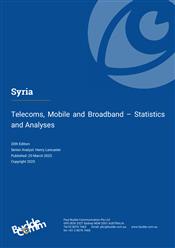Syria Telecoms Market Report
Telecoms, Mobile and Broadband - Statistics and Analyses

Publication Date: April 2024
Report Pages: 104
Analyst: Sebastien De Rosbo
Difficult operating environment forces out MTN Syria
The years of civil war and destruction to infrastructure continue to have a toll on the telecoms sector in Syria. Although over the years the major mobile service providers Syriatel and MTN Syria have endeavoured to restore and rebuild damaged networks, the operating environment has been difficult. Following disputed demands for back taxes, MTN Group in August 2021 exited the country, after its majority stake had been transferred to judicial guardianship. This effectively meant that the mobile market became a monopoly, with Syriatel as the only operator. Nevertheless, in February 2022 the regulator awarded a third mobile licence, to Wafa Telecom, following a process which had been ongoing for many years.
Telecommunication services in Syria are highly regulated. Although urban areas can make use of the network built and maintained by the government-owned incumbent Syrian Telecommunications Establishment (STE), many underserved remote areas in the countryside are obliged to rely on satellite communications. The domestic and international fixed-line markets in Syria remain the monopoly of the STE, despite several initiatives over the years aimed at liberalising the market.
Mobile broadband penetration in Syria is still quite low, despite quite a high population coverage of 3G networks and some deployment of LTE infrastructure. This may provide potential opportunities for growth once infrastructure and economic reconstruction efforts make headway, and civil issues subside.
Key developments:
- MTN Group exits the Syrian market, citing the difficult operating environment;
- Regulator licences Wafa Telecom as the third mobile operator;
- Civil unrest continues to disrupt telecom services, particularly in rural and remote areas which can be difficult to access.
- Emergency Telecommunications Cluster aid network operating in Syria to provide emergency internet connectivity and telecom services.
- Report update includes telcos' operating and financial data to Q4 2021, updated Telecom Maturity Index charts and analyses, assessment of the global impact of the pandemic on the telecoms sector, recent market developments.
Companies mentioned in this report include:
Syrian Telecommunication Establishment (STE), MTN Syria, Syriatel.
Related Reports
- Middle East - Fixed Broadband Market (Bundle 11 reports 2022-2023)
- Middle East - Mobile Network Operators and MVNOs
- Middle East - Mobile Infrastructure and Mobile Broadband
- Iran - Telecoms, Mobile and Broadband - Statistics and Analyses
- Bahrain - Telecoms, Mobile and Broadband - Statistics and Analyses
- Saudi Arabia - Telecoms, Mobile and Broadband - Statistics and Analyses
- United Arab Emirates - Telecoms, Mobile and Broadband - Statistics and Analyses
- Jordan - Telecoms, Mobile and Broadband - Statistics and Analyses
- Iraq - Telecoms, Mobile and Broadband - Statistics and Analyses
- Kuwait - Telecoms, Mobile and Broadband - Statistics and Analyses
Share this Report
TMT Intelligence
A platform to scale your intelligence tasks
Monitor critical insights with our AI-powered Market Intelligence Platform gathering and analyzing intelligence in real time. With AI trained to spot emerging trends and detect new strategic opportunities, our clients use TMT Intelligence to accelerate their growth.
If you want to know more about it, please see:
Research Methodology
BuddeComm's strategic business reports contain a combination of both primary and secondary research statistics, analyses written by our senior analysts supported by a network of experts, industry contacts and researchers from around the world as well as our own scenario forecasts.
For more details, please see:
More than 4,000 customers from 140 countries utilise BuddeComm Research
Are you interested in BuddeComm's Custom Research Service?
Hot Topics
News & Views
Have the latest telecommunications industry news delivered to your inbox by subscribing to BuddeComm's weekly newsletter.